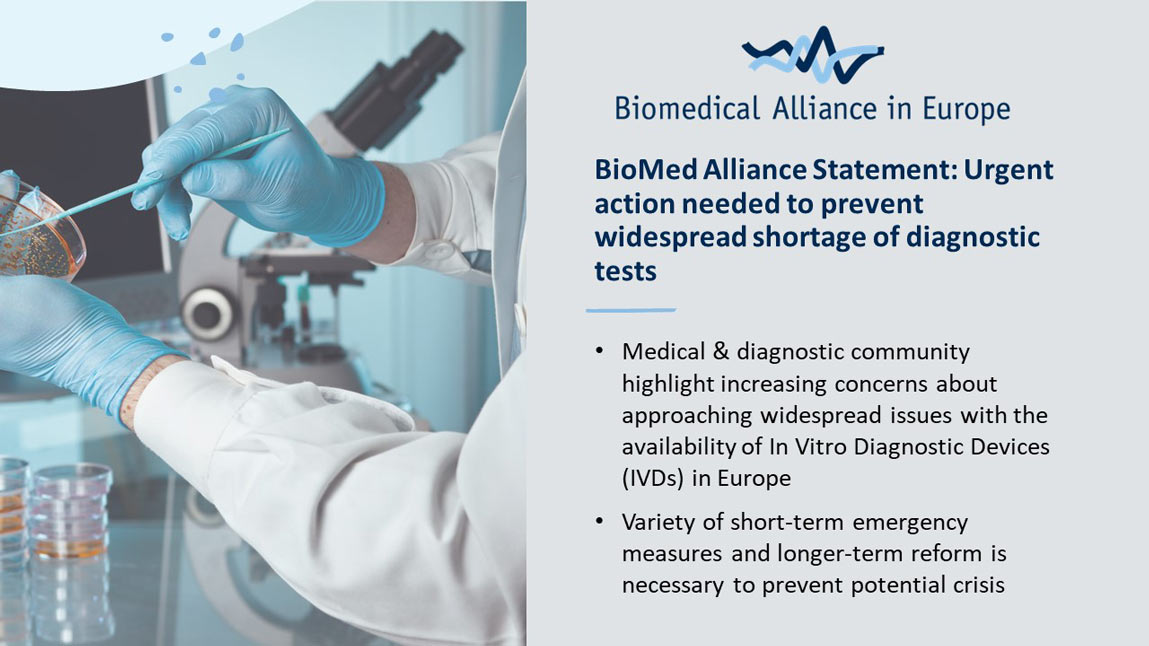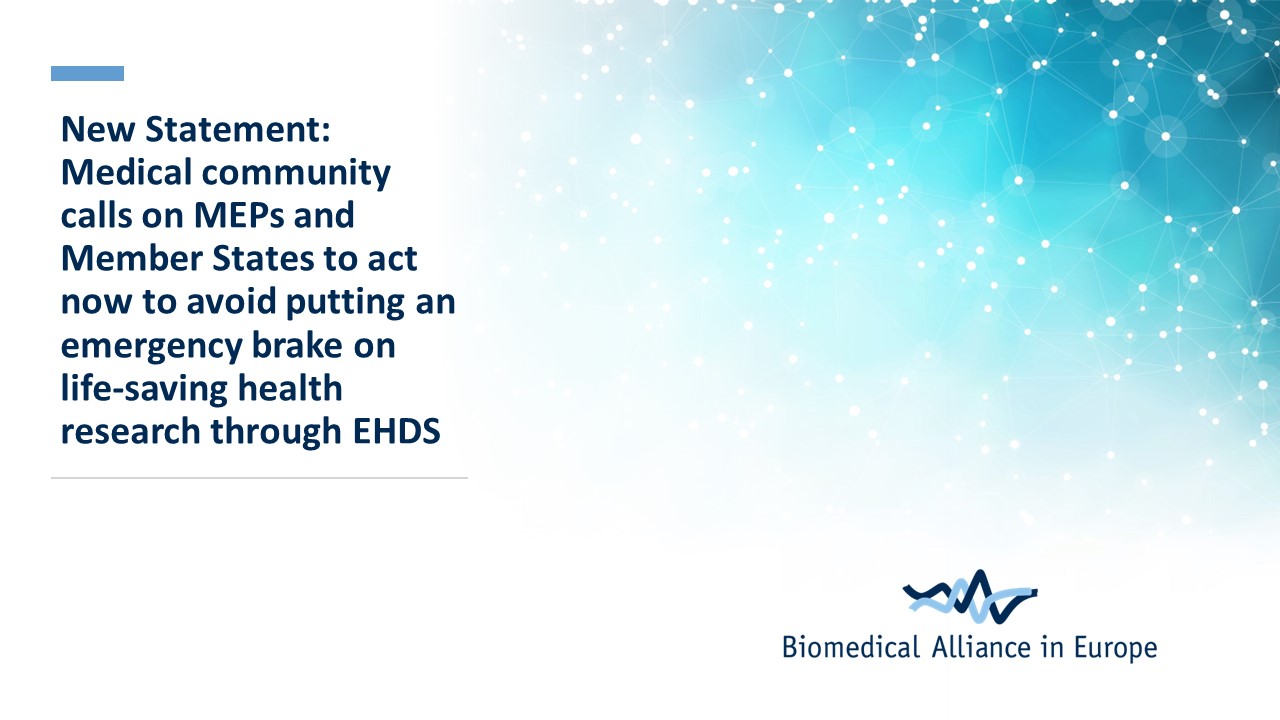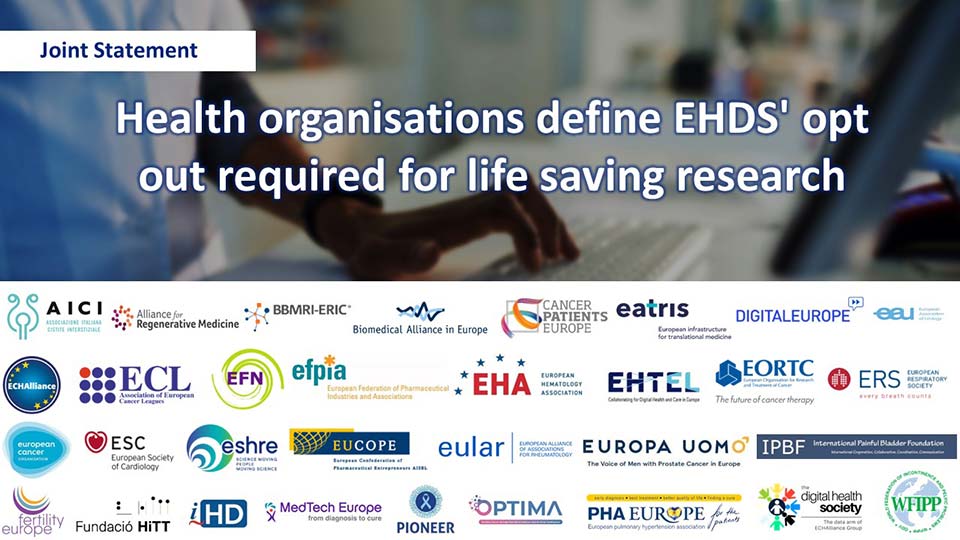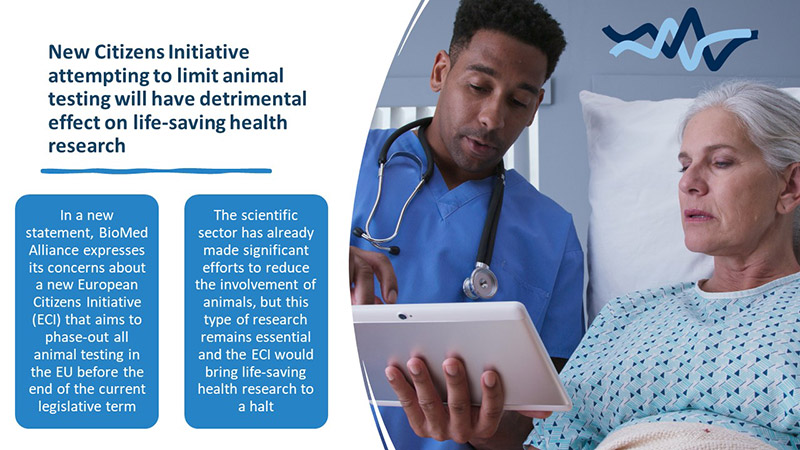News
Statement: Urgent action needed to prevent widespread shortage of diagnostic tests
- Details

In a new statement, BioMed Alliance highlights its increasing concerns about approaching widespread issues with the availability of In Vitro Diagnostic Devices (IVDs) in Europe. Persisting problems with the implementation of the In Vitro Diagnostics Regulation (IVDR), insufficient certificates issued, the failure to deliver the EUDAMED database and general unpreparedness of the sector could lead to the disappearance from the market of a large number of essential IVDs in the near future and related loss of international competitivity compared to other jurisdictions. The document calls for a mix of short-term solutions (including an extension of the transition period) and more longer-term reforms of the system to ensure pressing challenges are addressed.
Read more here
Update December 2023
- Details
Read our special end of the year Update for December 2023. In this Update you will get an overview of the main policy developments in December, and to mark the end of the year we look back at our main highlights throughout 2023 and at what is to come in 2024.
Stakeholder coalition statement calls for legislative refinement of the EHDS
- Details
Together with a large multi-stakeholder group, representing the entire spectrum of the healthcare ecosystem and consisting of 36 European patient organisations, medical associations, health research infrastructures and health industry associations, we have issued a joint statement to raise the alarm about the significant legislative shortcomings and uncertainties in the proposed Regulation for a European Health Data Space (EHDS).
The multi-stakeholder group is issuing this joint statement in advance of the plenary vote in the European Parliament scheduled on 13 December 2023. In addition, the group is raising its concerns ahead of a COREPER meeting on 6 December 2023 in the hope that Member States will make much-needed changes to the legislative text before reaching general approach.
There remain serious legislative problems with the EHDS, which is now being fast-tracked through both the European Parliament and Council. Stakeholders are concerned that if these problems are not addressed, then the legislation could generate more risks than benefits. The significant degree of legal ambiguity and uncertainty could pose risks for the protection of patient data as well as health research collaborations. As it stands, the potential effects of some of the key provisions in the EHDS are the opposite of what the original policy objectives were aiming for.
Read the statement here.
Update November 2023
- Details
In our new November Update you will find more information about our recent General Assembly, the new EHDS Statement, our consultation reply on the revision of the pharmaceutical legislation, a new HERA Civil Society Forum paper, recent CORE-MD workshops, a call for experts in public health emergencies, and a new survey on in silico medicine.
ENVI-LIBE vote on EHDS does not take into account recommendations scientific community
- Details
The BioMed Alliance is disappointed to see a partial opt-in approach for the re-use of health data for research in the new ENVI-LIBE position on the European Health Data Space (EHDS). The committees voted on the text on 28 November, and their provisions calling for a general opt-out system and a partial opt-in system could lead to barriers to health data sharing and fragmentation in the system. It is unfortunate that the recommendations of the scientific community were neglected and that life-saving health research on diseases, cures and prevention may be slowed down.
We hope that the upcoming plenary vote and trilogue negotiations will make sure that EHDS can still fulfil its intended objectives to facilitate health research.
Read more about our position here
BioMed Alliance leads drafting of HERA Civil Society Forum Discussion Paper
- Details
On November 17, the Civil Society Forum of the European Commission’s Health Emergency Preparedness and Response Authority (HERA) adopted its first discussion paper on the strategy and future role of HERA. The drafting of the paper was coordinated by the BioMed Alliance and it recommends increased investment into health emergency preparedness and response in addition to closer integration of strategies on the EU level. It focuses on a range of issues including strong and separate funding streams, enhanced coordination and the need to have a broader scope beyond merely medical countermeasures to immediate health emergencies. The paper will inform the upcoming mid-term review of HERA’s mandate in 2024
BioMed Alliance replies to consultation on the revision of the EU Pharmaceuticals legislation
- Details
Update October 2023
- Details
Urgent call on MEPs and Member States to act now to avoid putting an emergency brake on life-saving health research through EHDS
- Details

In a new statement, the BioMed Alliance urgently calls on policy makers to take action to ensure the European Health Data Space (EHDS) will not severely jeopardise health research. The health research community is extremely concerned about a partial opt-in system for the re-use of data for policy making and research in EHDS, which is currently being discussed by policy makers. Opt-in approaches significantly impinge on the availability of datasets for researchers to gain new insights into human health and understanding of disease, or for developing new diagnostics and treatments for patients. While the Alliance believes the original Commission proposal put sufficient safeguards in place to protect patient privacy, an opt-out approach could be a compromise solution if it is implemented appropriately. The statement also lists a series of key considerations which should be taken into account by decision makers in the Council and the Parliament to preserve life-saving research.
Read the statement here
Update September
- Details
Update August
- Details
August is coming to an end, and we hope you have all had a good summer. Even while enjoying some fun activities in the sun, the BioMed Alliance team continued their activities. Take a look below at the main highlights for BioMed Alliance and at EU level in our August 2023 Update.
In this edition you will find more information about our new health research committee, a call for a new member to our Board of Directors, advocacy activities to address the persisting unavailability of devices, an upcoming IMDRF session in Berlin and a new CORE-MD article on the clinical investigation and evaluation of paediatric devices.
New CORE-MD Press release highlights lack of evidence for high-risk medical devices
- Details
Investigators from the CORE-MD Project revealed at the end of August in an article in the European Heart Journal that a majority of new high-risk medical devices that are used to treat heart disease, have been released to the market in the European Union (EU) with insufficient evidence from clinical trials. BioMed Alliance is a partner in the EU funded CORE-MD project that aims to coordinate research and evidence for high-risk medical devices. The new findings indicate that too little information about the safety and performance of new implantable devices may be available for healthcare professionals to make informed decisions on patient care.
Read more in the new press release
Healthcare community calls for action: Do not fail patients and undermine the full potential of the European Health Data Space
- Details
BioMed Alliance, as part of a multi-stakeholder group consisting of 32 European patient organisations, medical associations, research organisations, data collaborations and industry associations met EU officials, including MEP Tomislav Sokol, Co-Rapporteur, as well as several permanent representations that will hold upcoming Presidencies of the Council of the European Union, to discuss how the European Health Data Space (EHDS) can facilitate health research and innovation to create tangible benefits for patients in the EU.
The meeting was held in follow-up to a joint statement issued by the group in June 2023 in which the organisations outlined the challenges of implementing an opt-out mechanism. In that statement, the group agreed that the Commission’s proposal strikes an adequate balance between delivering health-related benefits for patients in the EU and mitigating/eliminating any risks to their rights and interests.
The healthcare community remind that ensuring the trust of patients and other stakeholders in the healthcare system is vital. The group also call on legislators to adopt a consistent, EU-wide approach to unlock the potential value of using health-related data for research and innovation.
The 32 organisations raise their concerns that an opt-out or opt-in mechanism with regard to the secondary use of electronic health data under the EHDS may lead to health data disparities, where datasets underrepresent certain segments of the overall population. This would increase risks and undermine the reliability of data-driven health interventions. Instead of introducing more complexity, such as a general opt-out mechanism, more consideration should be given to ensure transparency and accountability regarding the processing operations performed on electronic health data and the results obtained from secondary use, and to the effectiveness of the safeguards in place.
Read the press release here
Update July
- Details
Read our July Update to get more information about new video material of the CORE-MD project, the EU Commission's response to an EU Citizen's Initiative aiming to ban animal testing, an open consultation on the revision of the EU pharmaceutical strategy, an update on HERA and contributions of the BioMed Alliance and members' news.
Update June
- Details
Read our June Update to get more information to get more information about a call for new members for our Board of Directors, a new letter to the Commission and Press Release on shortages of medical devices, a statement on the proposed opt-out in the EHDS, new EU4Health Calls, the BeWell Project General Assembly, and an update on the CORE-MD project on regulatory skills building among clinicians.
Doctors call on the Commission to address limited availability of medical devices, particularly for children
- Details
BioMed Alliance published a new press release calling on the European Commission to implement concrete actions in order to prevent a critical shortage of medical devices, particularly for children and people living with rare diseases. In an accompanying letter written by a number of prominent experts that was sent to Commissioner Kyriakides, the Alliance expressed its growing fear that Europe is on the track to a potential public health crisis, where essential medical devices may disappear from the EU market. The letter was also signed by health organisations and based on work in the CORE-MD project. It reflects the urgent concerns of healthcare professionals that are not always able to provide the same standard of care due to shortages.
It is only a matter of time before patients, and particularly children, experience serious consequences of the unavailability of devices or may even have a higher risk of mortality
BioMed Alliance joins large group of health stakeholders in their call for an appropriate opt-out mechanism in the EHDS
- Details

A joint statement of 32 European patient organisations, medical associations, research institutes and healthcare companies including the BioMed Alliance, was published to share their common views on specific recommendations for a potential opt-out mechanism in the EHDS. The group support the approach taken in the Commission's original legislative proposal from May 2022 as it strikes a sensible balance between protection of personal data while enabling the use of data for research and innovation to create tangible benefits for patients and citizens. The stakeholders raise concerns about the real risk that data bias will form part of the EHDS from its inception and thus undermine its principal value for secondary use research purposes if an opt-out or opt-in mechanism is approved, and call for an impact assessment that will inform implementation of this policy option. It is also in line with the earlier BioMed Alliance statement on the opt-out mechanism considered in current political discussions on the proposal.
Read the statement here.
Update May 2023
- Details
Read our May Update to get more information about new developments at EU level and our recent activities. In this Update you can read about our recent Spring Meeting, a new statement on the involvement of animals in biomedical research, an upcoming workshop on EU4Health, an EMA consultation on their guidance on registries and members' news.
New statement shares the concerns of the scientific community on a recent Citizens Initiative proposing to phase-out animal testing
- Details

The medical & scientific community represented within the BioMed Alliance has published a new statement expressing its strong concerns about the consequences of the European Citizens Initiative ‘Save cruelty free cosmetics - Commit to a Europe without animal testing’ for biomedical research. While the first two parts of the Citizens’ Initiative refer to protecting the animal testing ban for cosmetics and to transforming the chemicals regulation (the BioMed Alliance has no official position on this), the third part on modernising science could affect the European health research sector.
This Citizens Initiative calls on the Commission to introduce a ‘legislative proposal plotting a roadmap to phase-out all animal testing in the EU before the end of the current legislative term’ and is currently being considered by EU policy makers. The initiative was also discussed in a hearing in the European Parliament on 25 May and the Commission is preparing a response.
The proposed phase-out will have a detrimental effect on biomedical research and will significantly hinder the search for new insights into the characteristics and progress of diseases and the development of life saving treatment options for patients.
Read the statement here.
Update April 2023
- Details
Read our April Update to get more information about new developments at EU level and our recent activities. In this Update you can read about our upcoming Spring Meeting, the recent CORE-MD Consortium Meeting, the Revision of the EU Pharmaceutical Legislation, the European Health Data Space Amendments and an article on a new citizens initiative aiming to ban animal involvement in research.





